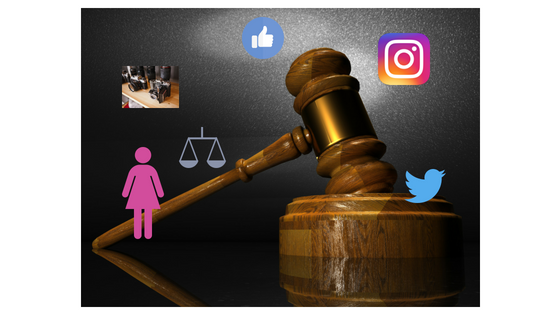Much of the discussion I have heard around social media and the law has focused on the inappropriate use of social media by a jury member, how it has been used as evidence to support a conviction or the appropriateness of the views a Judge has expressed on social media or in a blog.
However, the recent blog by Venitia Hillary on the #ACL701 hashtag on the use of social media and the statistics that showed more women are using Instagram than men started me thinking. My thoughts were how women use social media and if this could impact on a fair trial for a woman in the justice system.
Biases can be found everywhere. We hear and read about gender bias in human interaction, in pay discrepancies in employment, the gender differences in political parties, the coverage of female sport, salaries for athletes etc the list goes on. Bias can create unfair hurdles.
In the media, there seems to be continuous discussion around gender issues and biases. As I sit and watch how my sons and daughters engage differently with social media and reflect on the legal system I wonder if these differences will discriminate more against my daughters than my son’s. In the justice system personal integrity is often called into question and the question to what extent will a person’s social media profile define their integrity in a courtroom is unanswered.
Not only are women bigger users of Instagram than men they are also bigger users of Facebook and Pinterest. Further to this women and men, differ in how they present themselves on social media. According to research conducted women tend to post more about relationships and personal matters and tend to post more selfies, whilst men tend to use these platforms to give them influence and build and networks.
According to Social Media Today these differences are even more pronounced among younger users. Studies are showing that teenagers often use gender stereotypes to build their social media profiles. Teenage girls are more likely to post seductive photos of themselves, while boys are more inclined to share pictures related of risky behaviours, alcohol, or sex.
Scrolling through the profile pictures of teenagers on my kids Instagram accounts I have discovered this is very true. Despite countless discussions with my children they have all posted something I have deemed inappropriate and have had to ask them to remove. With teenagers, posting inappropriate things on social media can happen even under the best guidance.
Females are also more likely to post more information according to Facebook research. This means that a female’s social media profile could be very different to a male. The question then is how will this impact on them in a courtroom where credibility is being questioned.
Research conducted by The Guardian of an analysis of 70 million readers’ comments on their website showed that 8 of the 10 most abused journalists were women. Despite there being more male than female writers at The Guardian, the females certainly coped more of the abuse. This research did not state if the abuse came more from males than females.
Does this mean that females are viewed more harshly on social media than males and can this flow into the justice system? Social media has done amazing things to help convict people such as the Steubenville rape case. However, is there a down side.
With social media content being used more frequently in court cases the question is does this disadvantage women more than men because their information is more personal in nature.
According to Donahue & Sowa (2018) when gender discrimination occurs in the criminal justice system, individuals face unfair treatment that can lead to unfair sentences. The question is can a person’s social media profile result in a conviction or a sentence coming from a bias perspective and can this impact females more than males. One area where this could particularly disadvantage females is sexual assault cases where their credibility is often questioned.
Social media is a fact of modern life, but its impact on the right to a fair trial is still being measured. With men and women having different social media profiles can this affect a women’s right to a fair trial?

References
Atanasoua, A (2016), Gender-Specific Behaviors on Social Media and What They Mean for Online Communication, retrieved 31st July 2018,< https://www.socialmediatoday.com/social-networks/gender-specific-behaviors-social-media-and-what-they-mean-online-communications>.
Donahue & Sowa (2018) Are Men and Women Treated Differently by the Criminal Justice System? (2018), blog post, retrieved 30th July 2018 < https://www.dui-criminal-lawyers.com/dsmlaw-blog/men-and-women-treated-differently-criminal-justice-system>.
Haferkamp, N, Eimler S C, Papadakis, A.M, and Kruck J V (2012), Men Are from Mars, Women Are from Venus? Examining Gender Differences in Self-Presentation on Social Networking Sites, retrieved 31st July 2018 <https://www.liebertpub.com/doi/abs/10.1089/cyber.2011.0151>.
Sensis Social Media Report (2017), retrieved 30th July 2018, < https://irp-cdn.multiscreensite.com/535ef142/files/uploaded/Sensis_Social_Media_Report_2017-Chapter-1.pdf>.
The dark side of Guardian comments (2016) retrieved 30th July <https://www.theguardian.com/technology/2016/apr/12/the-dark-side-of-guardian-comments>.
Vermeren, I (2015) Men vs. Women: Who Is More Active on Social Media?, weblog post, retrieved 30th July 2018 <https://www.brandwatch.com/blog/men-vs-women-active-social-media/>
